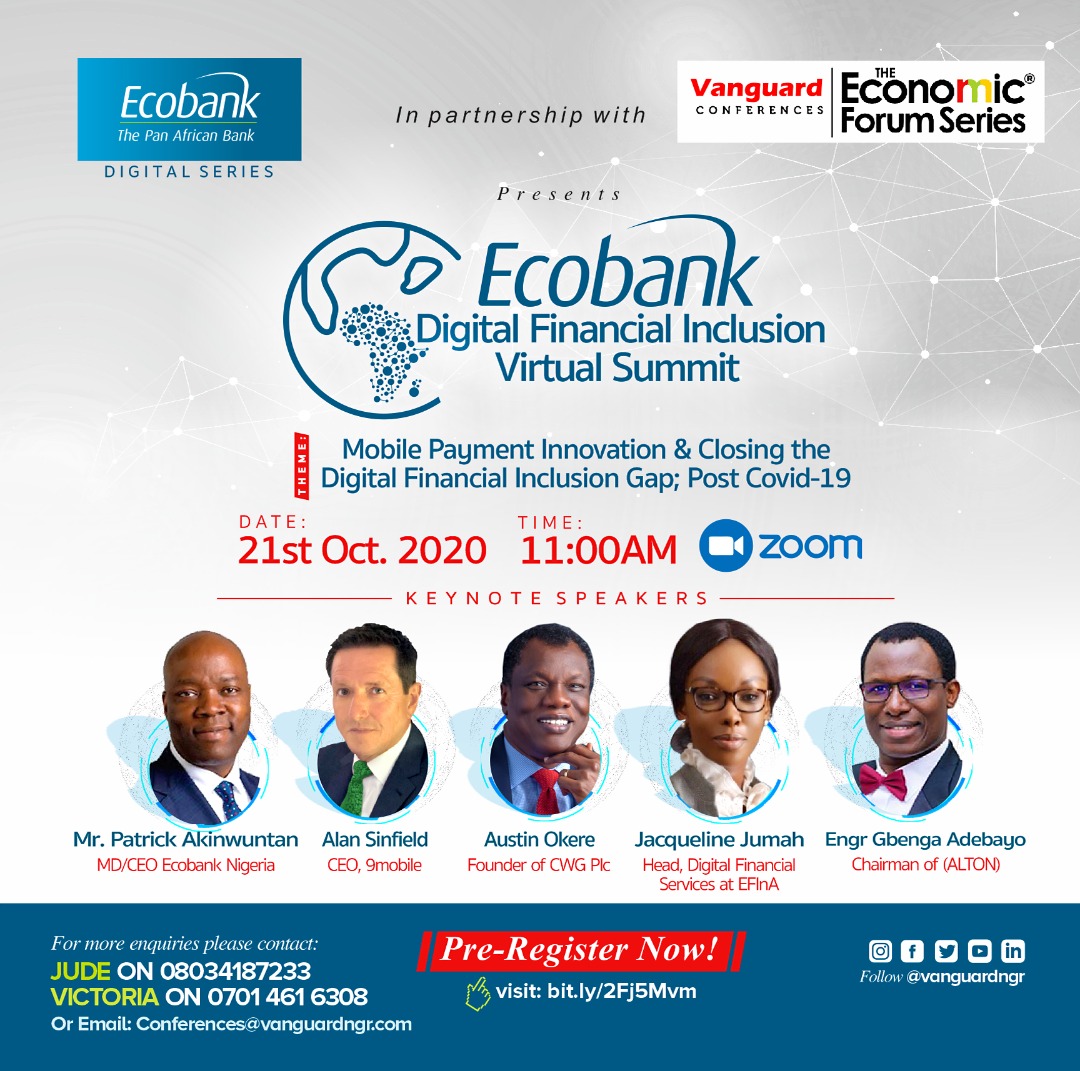We are pleased to invite you to register and attend Free the upcoming Ecobank Digital Financial Inclusion Virtual Summit organised in partnership with Vanguard.
The digitization of retail payment systems and financial services has become an important economic development priority and offers the prospect of reaching far more people at far lower costs with the broader range of financial services they need to build resilience, reduce poverty, hunger, gender equality, create jobs and growth of MSMEs post COVID-19.
Theme: Mobile Payment Innovation & Closing the Digital Financial Inclusion Gap; Post COVID-19
Date: Oct 21, 2020
Venue: Zoom Live Broadcast
Time: 11:00am – 1:00pm
What is The Meaning of digital financial inclusion?
“Digital financial inclusion” is broadly defined as the introduction of digital access to and subsequent use of formal financial services by the excluded and underserved members of a society.
Such services are created to suit customers’ needs, and the services delivered , at a cost both affordable and sustainable to customers and the service providers. Like nationwide home move box, financial inclusion services should be across the nation with beneficiaries in every household.
There are three main parts of digital financial services:
1.Digital transactional platform,
This is an application platform that enables a customer to use a device to make or receive payments, transfers and to store value electronically with a bank or nonbank permitted to store electronic value.
2.Retail agents
Retail agents hold a digital device connected to communications infrastructure to transmit and receive transaction details which allows customers convert cash into electronically stored value and to transform stored value back into cash.
3. Users
This refers to the use by customers and agents of a device – most commonly a mobile phone – to transact via the digital platform.
The customer device can be a mobile phone which is used for transmitting data and information or an instrument (e.g., payment card) that connects to a digital device (for example,POS terminal).
In some cases,the regulator such as the Central Bank may allow agents to perform other functions.
Digital transactional platforms yield further benefits for financial inclusion by providing both a means to access additional financial services, such as consumer credit, interest-bearing savings, insurance, and even investment products.
Also, they generate data that financial providers can use to design financial products that suit prepayment and repayment capacity and financial needs of the specific poor and low-income customer segments excluded or underserved by formal financial services.
What is changing with digital financial inclusion and what is on the horizon for policy makers?
With the advent of cheaper smartphones,more underserved populations are now embracing digital financial platform, it is projected that growth in this sector will be positive and the extent of the change will be in leaps.
Digital financial inclusion introduces new market participants and allocates roles and risks (both new and well-known) in different ways compared to traditional approaches to retail financial service delivery.
So what are the mobile payment innovations?
How can we close the gap in the digital financial inclusion, post covid-19?

Attend this virtual summit on zoom to find out.
Date: 21st October, 2020
Time: 11a.m
Venue: Zoom
This virtual summit is organized by Ecobank and Vanguard Conferences.
Highly experienced stakeholders and experts in digital financial inclusion will broaden your understanding of financial services inclusion and reveal to you the opportunities therein for you!

